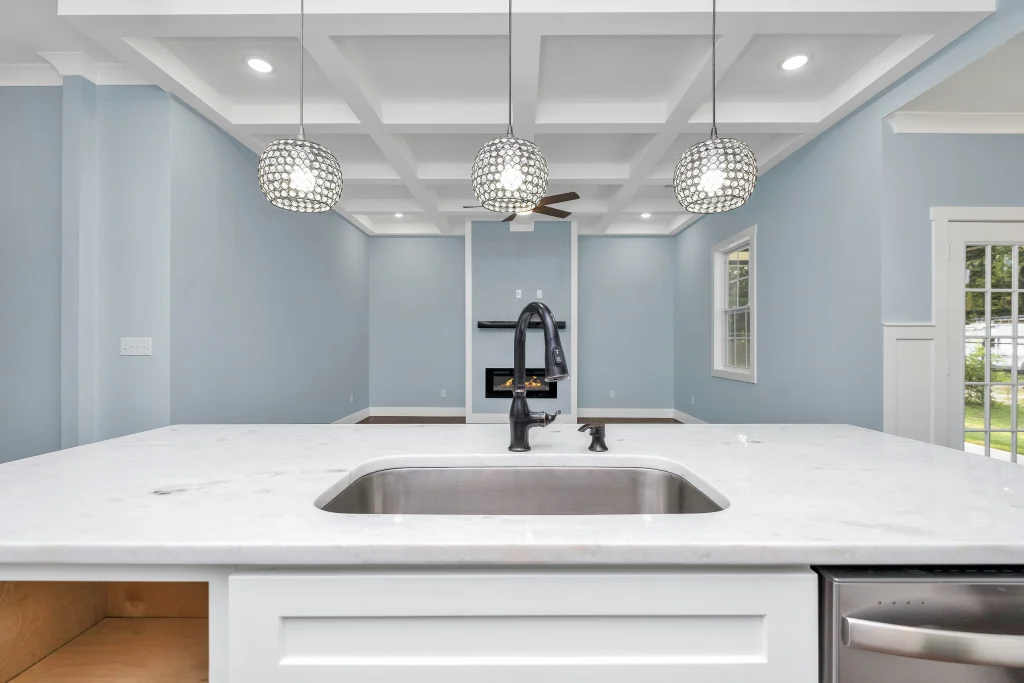In the heart of almost every modern home lies the kitchen, a space that is so much more than a room for cooking. It is the family hub, the social centre, and the epicentre of daily life. As such, the worktops in this area are subjected to a constant barrage of activity, from hot pans and sharp knives to spilt food and daily cleaning. For commercial spaces and busy family homes alike, the choice of a worktop material is a critical decision that balances aesthetics with practicality and durability, and FM Marble offers a variety of options.
For years, natural stones like granite and marble dominated the market, but in recent times, a new contender has risen to prominence: quartz. This engineered stone has earned a reputation for its beauty and versatility, but a key question remains for those with a high-traffic lifestyle: can quartz worktops really handle heavy use and the constant demands of a busy environment? The answer, for the vast majority of applications, is a resounding yes. Its unique properties make it an incredibly resilient and practical choice, often outperforming its natural stone rivals.
What Makes a Quartz Worktop? The Science Behind the Stone
To understand the durability of quartz, you must first understand what it is. Unlike granite or marble, which are quarried as single, solid slabs, quartz worktops are an engineered stone. They are manufactured by combining approximately 90-95% ground natural quartz with 5-10% resins, polymers, and pigments. This mixture is then compacted into dense, solid slabs.
It is this manufacturing process that gives quartz its superior performance characteristics. The resins act as a binder, filling in the microscopic pores and creating a non-porous surface. This is the key to its strength and resistance to stains and bacteria. The result is a highly consistent, uniform material that is far less susceptible to the natural imperfections found in quarried stone.
The Durability Test: How Quartz Stands Up to Daily Life
The real measure of a worktop is how it performs under pressure. Here’s a breakdown of how quartz handles the challenges of heavy use:
- Resistance to Stains
This is one of the biggest advantages of quartz. Because it is non-porous, liquids like coffee, wine, juice, and oil cannot penetrate the surface. A spilt glass of red wine, which would leave a permanent mark on a porous natural stone like marble, can be simply wiped away with a cloth on a quartz worktop. This makes it an ideal choice for a busy family kitchen or a commercial bar, where spills are an everyday occurrence.
- Scratch and Chip Resistance
Quartz is one of the hardest minerals on earth, and this natural hardness is retained in the engineered slab. This makes a quartz worktop highly resistant to scratches and chipping from normal daily use. While you should still use a chopping board to protect both your knives and the worktop, a dropped pot or a slip of a utensil is far less likely to cause a permanent mark than on a softer material like marble.
- Low Maintenance
The non-porous nature of quartz means it doesn’t need to be sealed, ever. Natural stones like granite and marble require regular sealing (often every 6-12 months) to prevent staining and bacterial growth. Quartz worktops, by contrast, only require simple cleaning with mild soap and water or a non-abrasive household cleaner. This minimal maintenance is a huge selling point for high-traffic environments where time and effort are at a premium.
- Hygiene
The non-porous surface of quartz also makes it an incredibly hygienic choice. It doesn’t harbour bacteria, mould, or mildew, making it a safe and clean option for food preparation areas, commercial kitchens, and healthcare facilities.
Quartz vs. The Competition: A Head-to-Head
When comparing quartz to other popular worktop materials, its advantages in high-traffic areas become even clearer.
- Quartz vs. Granite: Granite is a beautiful, natural stone that is also very hard and durable. However, it is porous and must be sealed regularly. Without proper sealing, it is susceptible to staining. Quartz, being non-porous, offers superior stain resistance and requires no sealing.
- Quartz vs. Marble: Marble is known for its classic elegance, but it is a relatively soft and porous stone. It scratches easily and is highly susceptible to staining from acidic liquids like lemon juice or wine. In a busy kitchen, a marble worktop will develop a patina over time, which some people love, but others find to be a sign of damage. Quartz provides a similar aesthetic to marble without any of the fragility.
- Quartz vs. Laminate: Laminate is an affordable, lightweight option, but it is not particularly durable. It can scratch, dent, and is not resistant to heat. A hot pan placed directly on a laminate surface will melt or scorch it. Quartz is far superior in terms of both durability and heat resistance (though caution is still needed).
Potential Limitations: Where to be Careful
While quartz is an exceptionally durable material, it is not indestructible. It’s important to be aware of its few limitations to ensure its longevity.
- Heat Resistance: While quartz is more heat-resistant than laminate, the resin binders can be damaged by extreme temperatures. Placing a very hot pan or dish directly from the oven or hob onto the surface can cause discolouration or a burn mark. Always use a trivet or heat pad to protect the surface.
- UV Exposure: Long-term exposure to direct sunlight can cause some quartz colours to fade. For this reason, quartz is not typically recommended for outdoor kitchens or areas that receive prolonged, direct UV light.
- Chemicals: Harsh chemicals and abrasive cleaners containing solvents can damage the surface. It is best to stick to mild soap and water or a cleaner specifically designed for quartz.
The Verdict: The Perfect Choice for High-Traffic Areas
Ultimately, the choice of a worktop material comes down to a blend of personal preference, budget, and lifestyle. But for environments that demand durability, hygiene, and minimal maintenance, quartz stands out as a clear frontrunner. Its unique engineered properties make it resistant to the wear and tear that would quickly damage other materials.
From the constant hustle of a family kitchen with children to the demanding environment of a commercial establishment, a quartz worktop offers the peace of mind that comes with a material that can withstand heavy use without losing its beauty or integrity. It provides the luxurious look of natural stone without the associated maintenance concerns, making it an ideal investment for anyone seeking a long-lasting, practical, and stunning solution.









